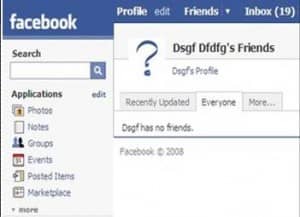A new report by security firm Cloudmark has warned that between 20 and 40 per cent of new Facebook profiles could be fictitious registrations created by spammers and malware writers. Apart from simply flooding regular Facebookers with requests to visit their site, these faux profiles can also be used to infect end users.
Once a phony profile portfolio is generated, virus writers have been encouraging ordinary users to click on links to malicious sites by posting links on personal and group walls.
 Regular users have also been invited to visit sham profile pages through friend requests or personal messages. The profile page itself then redirects people to a malware site.
Regular users have also been invited to visit sham profile pages through friend requests or personal messages. The profile page itself then redirects people to a malware site.
Neil Cook, European head of technology services at Cloudmark said, “Social networks are very collaborative so it’s great for spammers and virus writers to attack… as soon as social networking took off, so did the attacks.”
Fake profiles have been a problem for Facebook from the start, with fraudsters assuming a person’s identity on the social networking site, then adding their real friends.
It was also reported last year that 26 year old Fouad Mourtada from Morocco was arrested on Villainous Practices charges, for creating a Facebook profile for the Moroccan king's younger brother, Prince Moulay Rachid.
Source: Yahoo News
